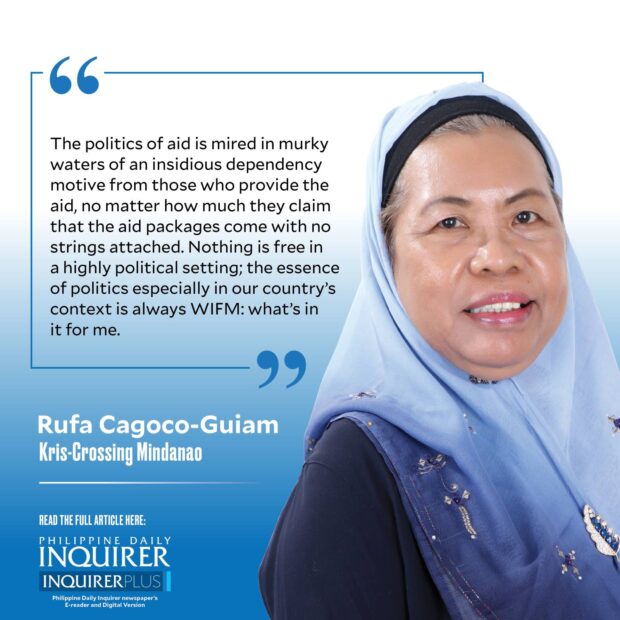‘Ayuda’ governance

General Santos City—President Marcos’ “lightning visit” to several localities in South Cotabato, Cotabato, Sultan Kudarat, Sarangani, and General Santos City (Soccsksargen) last Friday was reminiscent of the days of his father and namesake’s heydays in the martial law period. Even the speeches he gave reminded us of the same eloquent lines his father used to deliver to impoverished audiences in different parts of the country. A common theme runs through his speeches: “When we are united, we can hope for a better, and new Philippines.”
And the distribution of the “ayuda” that day? It also reminded me of the days when former first lady Imelda Marcos visited slum communities in Metro Manila, bringing wads of P1,000 bills to be handed out to those who met her. She used to say that doing that was “bringing light to those who are in the dark,” a metaphor for being an “angel” she has arrogated to herself while multitudes of people in the Bangsamoro region suffered under draconian containment policies under martial law.
According to the Presidential Communications Office, Mr. Marcos’ visit was to distribute much-needed assistance (ayuda) to farmers in these areas since they have been badly hit by the long dry spell. In many parts of Soccsksargen, many farmers have complained that all their crops have withered in the past three months. For Gensan alone, the amount of cash assistance was P110 million.
A select group of farmers (actually landless farmworkers) were made to line up to meet with the President and his party that included former senator Manny Pacquiao and his sister-in-law, Lorelei Pacquiao, the current local chief executive of General Santos City; Manny’s brother Ruel Pacquiao, governor of Sarangani province. Each farmer beneficiary got a P10,000 cash gift, five kilos of rice, and a packed lunch. It was quite an orderly event since strict security protocols were implemented starting at the gate of the Lagao gym where the distribution event happened.
This “surprise” windfall was appreciated by those who received it, although many of them also wondered how they were chosen from a multitude of poverty-stricken farmworkers in more than 10 of Gensan’s 26 barangays. The event became a trending topic in local mainstream and social media, especially the latter, which became the sounding board of those who felt that they had been left out.
Mr. Marcos has sustained the same governance tactics his father has used, except perhaps for the draconian martial law guidelines. However, as many development studies have shown, the distribution of aid packages after disasters (like droughts and flooding) are mostly just “band-aid” type of solutions to persisting problems of abject poverty among many farming communities, and even of those residing in urban areas like here in Gensan. They are non-skilled workers and work as daily wage earners in (fish) canning factories and in the city’s sprawling fish port in Barangay Tambler.
This is the kind of governance that has also sustained people’s poverty levels, making them highly dependent on the ayuda that both local and national governments provide after noting how ordinary people suffer from the effects of extreme weather events like droughts and flooding. Moreover, many of the assistance packages do not factor in the special needs of some recipients, since these are already packed, and pre-positioned even before disasters strike.
Members of communities prone to these extreme weather events brought about by climate change may face the same challenges and consequences of such events, but their needs are not exactly the same. Poor community members are not equal in their poverty levels, and their capacities for coping and resilience are not equal as well. However, they have never been consulted prior to disaster events on their capacities and needs. Community voices are important in assessing whether the dependency on ayuda can be lessened, while capacity-building approaches to make them attain livelihood security can be promoted quite vigorously.
The politics of aid is mired in murky waters of an insidious dependency motive from those who provide the aid, no matter how much they claim that the aid packages come with no strings attached. Nothing is free in a highly political setting; the essence of politics especially in our country’s context is always WIFM: what’s in it for me.
Unfortunately, the distribution of ayuda is always perceived as part of a chief executive’s benevolent style of governance—people have forgotten that the cash these officials are distributing also comes from the taxes that even poor people themselves contribute to national coffers.
Comments to rcguiam@gmail.com
















